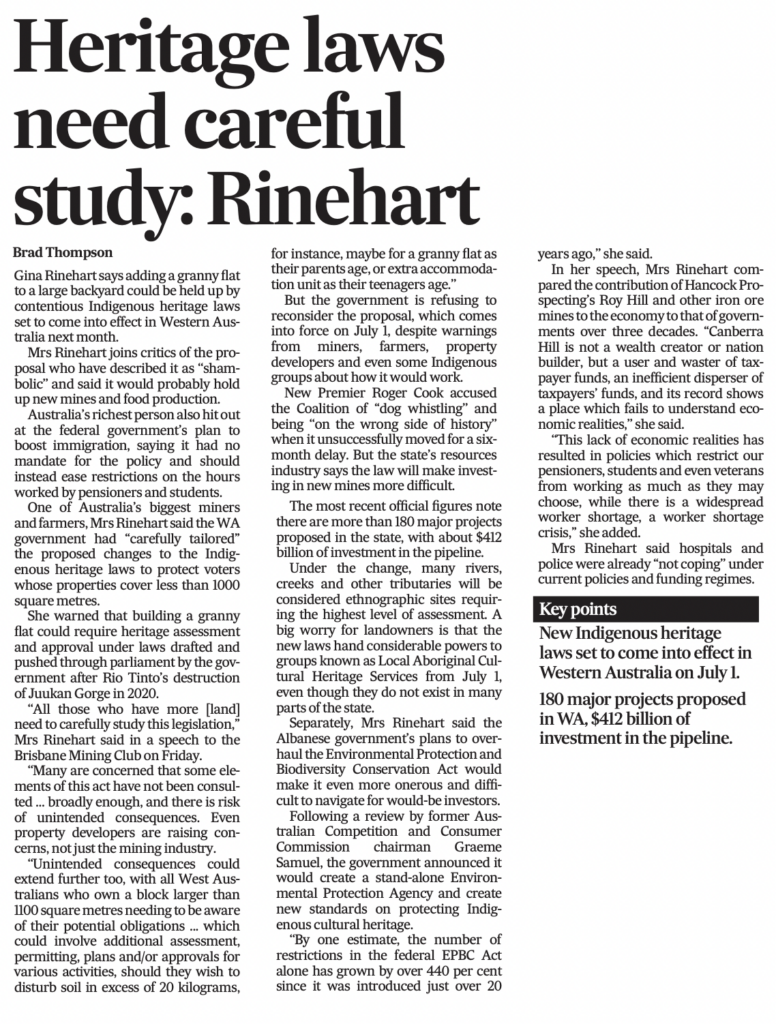
Article by Brad Thompson courtesy of the Australian Financial Review Weekend.

Gina Rinehart says adding a granny flat to a large backyard could be held up by contentious Indigenous heritage laws set to come into effect in Western Australia next month.
Mrs Rinehart joins critics of the proposal who have described it as “shambolic” and said it would probably hold up new mines and food production.
Australia’s richest person also hit out at the federal government’s plan to boost immigration, saying it had no mandate for the policy and should instead ease restrictions on the hours worked by pensioners and students.
One of Australia’s biggest miners and farmers, Mrs Rinehart said the WA government had “carefully tailored” the proposed changes to the Indigenous heritage laws to protect voters whose properties cover less than 1000 square metres.
She warned that building a granny flat could require heritage assessment and approval under laws drafted and pushed through parliament by the government after Rio Tinto’s destruction of Juukan Gorge in 2020.
“All those who have more [land] need to carefully study this legislation,” Mrs Rinehart said in a speech to the Brisbane Mining Club on Friday.
“Many are concerned that some elements of this act have not been consulted … broadly enough, and there is risk of unintended consequences. Even property developers are raising concerns, not just the mining industry.
“Unintended consequences could extend further too, with all West Australians who own a block larger than 1100 square metres needing to be aware of their potential obligations … which could involve additional assessment, permitting, plans and/or approvals for various activities, should they wish to disturb soil in excess of 20 kilograms, for instance, maybe for a granny flat as their parents age, or extra accommodation unit as their teenagers age.”
But the government is refusing to reconsider the proposal, which comes into force on July 1, despite warnings from miners, farmers, property developers and even some Indigenous groups about how it would work.
New Premier Roger Cook accused the Coalition of “dog whistling” and being “on the wrong side of history” when it unsuccessfully moved for a six month delay. But the state’s resources industry says the law will make investing in new mines more difficult.
The most recent official figures note there are more than 180 major projects proposed in the state, with about $412 billion of investment in the pipeline.
Under the change, many rivers, creeks and other tributaries will be considered ethnographic sites requiring the highest level of assessment. A big worry for landowners is that the new laws hand considerable powers to groups known as Local Aboriginal Cultural Heritage Services from July 1, even though they do not exist in many parts of the state.
Separately, Mrs Rinehart said the Albanese government’s plans to overhaul the Environmental Protection and Biodiversity Conservation Act would make it even more onerous and difficult to navigate for would-be investors.
Following a review by former Australian Competition and Consumer Commission chairman Graeme Samuel, the government announced it would create a stand-alone Environmental Protection Agency and create new standards on protecting Indigenous cultural heritage.
“By one estimate, the number of restrictions in the federal EPBC Act alone has grown by over 440 per cent since it was introduced just over 20 years ago,” she said.
In her speech, Mrs Rinehart compared the contribution of Hancock Prospecting’s Roy Hill and other iron ore mines to the economy to that of governments over three decades. “Canberra Hill is not a wealth creator or nation builder, but a user and waster of taxpayer funds, an inefficient disperser of taxpayers’ funds, and its record shows a place which fails to understand economic realities,” she said.
“This lack of economic realities has resulted in policies which restrict our pensioners, students and even veterans from working as much as they may choose, while there is a widespread worker shortage, a worker shortage crisis,” she added.
Mrs Rinehart said hospitals and police were already “not coping” under current policies and funding regimes.
Key points New Indigenous heritage laws set to come into effect in Western Australia on July 1.
180 major projects proposed in WA, $412 billion of investment in the pipeline.
